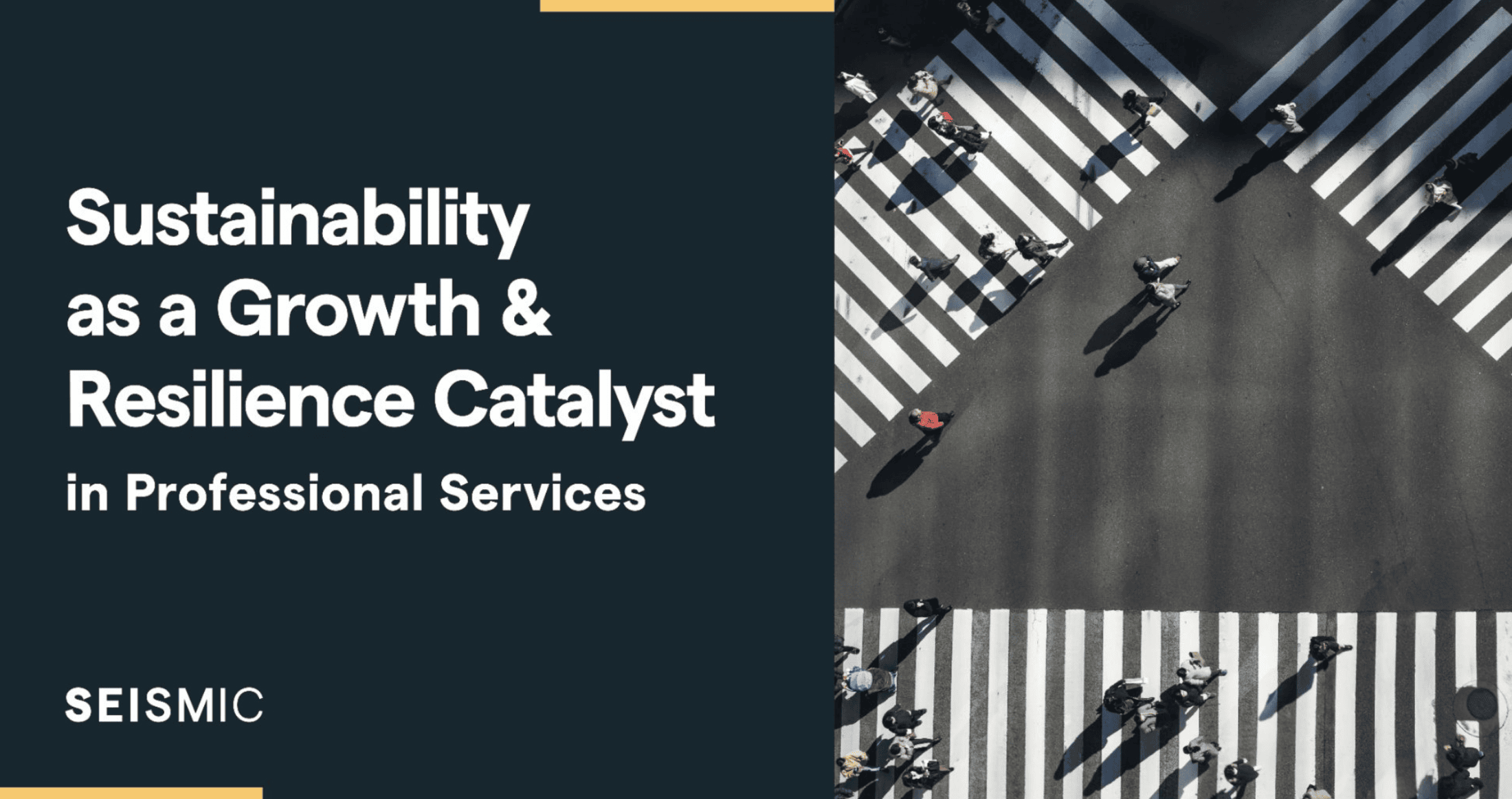
Our recent Breakfast Briefing convened leaders from across the professional services sector to delve into the transformative power of sustainability in driving growth and resilience.
Seismic’s Cofounders, Amy Bourbeau and Paul Lewis, were joined by Jim Brown, Partner at Blick Rothenberg, to highlight the unique position of professional service firms to lead the charge in using business as a force for good.
The business case for sustainability
The discussion emphasised the compelling business case for sustainability in professional services, citing the Edelman Trust Barometer, which reveals that businesses are now seen as more trustworthy than governments. This presents a significant opportunity with professional services firms in a unique position to leverage their influence and expertise and drive forward positive impact, while simultaneously reaping commercial benefits.
The Purpose Dividend report, which forecasts a £149bn boost to the UK’s GDP through a shift towards purpose-driven business, further underscores the economic potential of sustainability.
Just some of the key benefits of embedding sustainability in professional services include:
- Value Creation: Enhancing brand reputation and attracting clients who prioritise sustainability.
- Revenue Growth: Generating new business opportunities and increasing revenue through sustainability-focused services.
- Talent Acquisition and Retention: Attracting and retaining top talent by fostering a purpose-driven and values-led workplace.
- Resilience Building: Mitigating risks and enhancing adaptability in the face of environmental and social challenges.
Employee engagement and the power of collective action
Drawing on insights from Ayana Elizabeth Johnson’s book “What If We Get It Right?”, the discussion highlighted the importance of employee engagement in driving sustainability initiatives. With 70% of people concerned about climate change and a significant portion eager to be involved in solutions, professional services firms have a powerful internal resource to tap into: their people.
This means moving beyond simply informing employees about sustainability goals. It’s about empowering them to become active participants in the journey, contributing their ideas, skills, and passion to create a more sustainable future. Not only this, but Johnson’s book also highlights that 11% of people are willing to be actively engaged with Climate Change but have not yet taken action. This is a group that businesses have the ability to influence to engage with these key issues.
The concept of Serviced Emissions is a recent development in the sustainability space. These represent the emissions that do not fall within the scope of a company’s traditional footprint but those which they have contributed towards another company emitting.
This was extrapolated to the idea of serviced impact, emphasising the ability of professional services firms to amplify their positive impact by embedding sustainability into every aspect of their operations and client offerings. This involves moving beyond a focus solely on carbon emissions and considering the broader social and environmental impact of their work.
A related topic was understanding and meeting client expectations regarding sustainability. Participants highlighted the need for professional services firms to be a source of knowledge and expertise, helping clients navigate the complexities of ESG regulations and reporting requirements. Authenticity, transparency, and a genuine commitment to sustainability were identified as crucial for building trust and credibility with clients.
Blick Rothenberg: Leading with purpose in the accounting industry
Jim Brown, Partner at Blick Rothenberg, a mid-sized accounting firm, shared how their purpose-driven approach is shaping their sustainability journey. He emphasised their commitment to “improving the lives of our colleagues, clients, and communities in a sustainable way.”
Jim highlighted how Blick Rothenberg prioritises key stakeholders in their sustainability efforts, including employees, investors, the communities they operate in, the accounting industry, and their clients. He shared examples of their initiatives, such as employee resource groups, community work experience programs, and their BRave podcast series, which addresses important industry issues.
Jim also discussed how Blick Rothenberg is meeting evolving client expectations regarding sustainability by providing expertise, leading by example, empowering employees, and shaping expectations. He stressed the importance of authenticity, transparency, and continuous learning in building trust and credibility with clients.

Challenges and solutions
The session explored common challenges faced by professional services firms in their sustainability journeys. These included the ever-present struggle with time constraints and competing priorities, where dedicating resources to sustainability initiatives can feel like a challenge amidst demanding client work and day-to-day operations.
Another key challenge was integrating sustainability into client offerings in a way that resonates with their needs and delivers tangible value. Participants grappled with the need to balance financial and sustainability goals, ensuring that investments in sustainability align with business objectives and demonstrate a clear return on investment
Navigating the complex and evolving landscape of ESG regulations and reporting frameworks was another key concern, particularly for firms with limited resources, as well as the importance of upskilling staff and fostering internal engagement, emphasising that building internal capacity and a culture of sustainability are crucial for long-term success.
In response to these challenges, participants discussed a range of solutions:
- Leadership prioritisation: Prioritising sustainability at the leadership level to send a clear signal and enable resource allocation.
- Dedicated teams: Creating dedicated sustainability teams or roles to provide focus and expertise.
- Strategic planning: Developing clear sustainability strategies with measurable goals and timelines to guide efforts and track progress.
- Technology utilisation: Leveraging technology for data management and reporting to streamline processes and enhance efficiency.
- Continuous learning: Fostering a culture of continuous learning and providing opportunities for employee involvement to empower individual contributions.
Key takeaways for sustainable growth
Our Breakfast Briefing emphasised that sustainability is not just a moral imperative but also a powerful catalyst for growth and resilience in the professional services sector.
By embracing sustainability, firms can enhance their reputation, attract and retain talent, create new business opportunities, and contribute to a more sustainable and equitable future.
We future-proof professional services firms through the fast-changing sustainability landscape, turning environmental and social progress into a competitive edge. Speak with one of our experts today.

